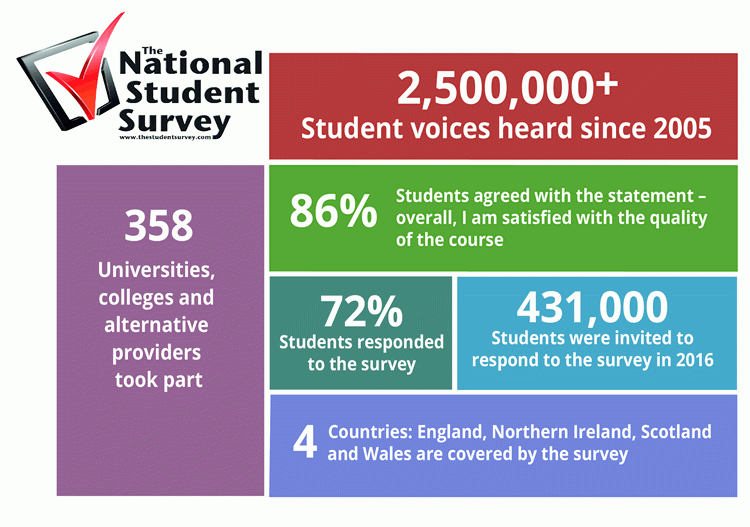National Student Survey 2016: Vast majority of students satisfied with their course, despite rising tuition fees
High score comes even though NUS passed a motion earlier this year encouraging students to boycott the survey which is linked to education reforms and higher fees

Your support helps us to tell the story
From reproductive rights to climate change to Big Tech, The Independent is on the ground when the story is developing. Whether it's investigating the financials of Elon Musk's pro-Trump PAC or producing our latest documentary, 'The A Word', which shines a light on the American women fighting for reproductive rights, we know how important it is to parse out the facts from the messaging.
At such a critical moment in US history, we need reporters on the ground. Your donation allows us to keep sending journalists to speak to both sides of the story.
The Independent is trusted by Americans across the entire political spectrum. And unlike many other quality news outlets, we choose not to lock Americans out of our reporting and analysis with paywalls. We believe quality journalism should be available to everyone, paid for by those who can afford it.
Your support makes all the difference.Leading figures in the higher education community have praised this year’s National Student Survey (NSS) results for showing high levels of university satisfaction, despite the fact tuition fees are to rise even further.
Eighty-six per cent of final-year students at UK universities have said they were satisfied with their course, the same high figure to have emerged from the survey’s results over the last two years.
Conducted by Ipsos MORI on behalf of UK funding bodies, the survey provides useful information for prospective students and helps universities and colleges to further improve the education they provide.
From the 312,000 undergraduates who took part this year, the response was 72 per cent - slightly higher than 2014 and 2015 - with 10,000 more final year students taking part.
Hefce chief executive, Professor Madeleine Atkins, said she was “pleased” to see the results of this year’s survey remain “very positive,” something, she said, demonstrated the commitment of all higher education providers to deliver high-quality teaching and learning for their students.
She added: “The response rate is very encouraging and ensures the student voice continues to inform enhancements in quality and in the information available to the next cohort of students. The increase in the number of alternative providers taking part in the survey on a voluntary basis for this year is a reflection of how important the survey is to the sector and highlights the increasing diversity of higher education in the UK.”
Pam Tatlow, chief executive of MillionPlus - which promotes the role played by modern universities - also said the NSS’s results are a tribute to the “fantastic work” done by university staff and management during a period of “significant change.” She added: “These satisfaction rates are much higher than those achieved in many private and public sector organisations, and provide further evidence that UK universities are performing extremely well.”
General secretary of the University and College Union (UCU), Sally Hunt, said: “The results are testament to the hard work of college and university staff, who continue to deliver a high-quality experience for students.”
Alistair Jarvis, deputy chief executive of Universities UK, highlighted how the UK's university sector has a “well-deserved” international reputation for high-quality teaching and learning, something universities are seeking to “continually enhance” what they offer to students.
He continued: “In recent years, universities have increased investment in teaching and learning and are continuing to respond to student feedback to further improve their higher education experience.
“With the Government’s new Teaching Excellence Framework (TEF) for universities in England under development, these impressive results are a timely reminder that most students report strong satisfaction with the high quality teaching and learning experience that universities provide.”
The results from NSS help to decide TEF ratings, meaning they are also linked with the amount of tuition fees each university is able to charge.

This year’s high score has come despite the fact that the National Union of Students (NUS) passed a motion at its National Conference in Brighton in April, encouraging students to either boycott the NSS - or sabotage it by giving artificially maximum or minimum scores - believing this could “render the TEF unworkable, and seriously disrupt the Government’s HE reforms as a whole.”
The students’ union at Sheffield University (SSU) was one group to join in the campaign to sabotage the NSS in May in order to stop the Government from raising tuition fees even higher. The union, which was named the UK’s best by the NSS for the fourth year in a row last year, said it wanted to find alternative ways for students to give feedback on their courses, without using the metrics, which could leave younger generations in “a lifetime of even more debt.”
SSU education officer, Minesh Parekh, who proposed the sabotage policy at the time, described the TEF proposals as being “incredibly ideological.” He said: “All we have left is to play the Government at their own game, and strike at the heart of their plans.”
This year’s NSS results have contradicted the outcome of a new report into student satisfaction from The Student Room (TSR) which found students’ satisfaction with their university experience is continuing to fall. According to that report, satisfaction has continued to fall year-on-year, with the overall rating falling from 7.7/10 in 2014 to 6.9/10 in 2016.
Chris Newson, CEO of TSR, said: “The education industry needs to continue to work hard to address this challenge head on. Universities can help students by building good relationships with employers and supporting their careers and aspirations whilst at university.
“Another big factor in improving university satisfaction is helping students to make the right decision in the first place. Helping them to research their course thoroughly will increase overall satisfaction in the long term.”
Join our commenting forum
Join thought-provoking conversations, follow other Independent readers and see their replies
Comments